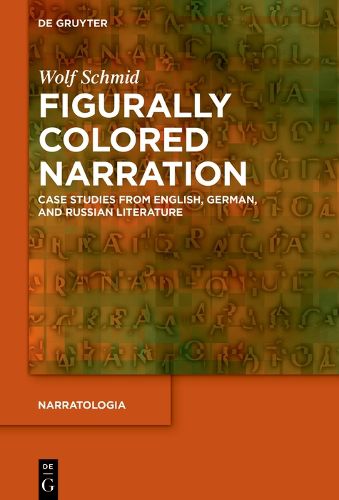Readings Newsletter
Become a Readings Member to make your shopping experience even easier.
Sign in or sign up for free!
You’re not far away from qualifying for FREE standard shipping within Australia
You’ve qualified for FREE standard shipping within Australia
The cart is loading…






This title is printed to order. This book may have been self-published. If so, we cannot guarantee the quality of the content. In the main most books will have gone through the editing process however some may not. We therefore suggest that you be aware of this before ordering this book. If in doubt check either the author or publisher’s details as we are unable to accept any returns unless they are faulty. Please contact us if you have any questions.
Figurally colored narration (FCN) is narrator’s discourse (whether in the first or third person) that adopts salient features of character’s text, mainly valuation and designation, without signaling the figural part in any way. Unlike free indirect discourse, FCN does not refer to current acts of consciousness, but to typical, characteristic segments of the character’s text. There are two main modes of FCN: contagion of the narrator’s discourse with a character’s text, and the more or less ironical reproduction of a character’s text in narrative discourse. In the latter case, the narrator’s criticism may refer to either the content of the character’s text or to its form of expression.
This study begins with a definition and an example of FCN as a narrative device, followed by an analysis of terms used for FCN in German, Anglophone and Russian literary criticism. Building on the perception of FCN as a phenomenon of interference between narrator’s and character’s text (text interference), this book analyses the function and applications of FCN in narratives written in German, English and Russian.
$9.00 standard shipping within Australia
FREE standard shipping within Australia for orders over $100.00
Express & International shipping calculated at checkout
This title is printed to order. This book may have been self-published. If so, we cannot guarantee the quality of the content. In the main most books will have gone through the editing process however some may not. We therefore suggest that you be aware of this before ordering this book. If in doubt check either the author or publisher’s details as we are unable to accept any returns unless they are faulty. Please contact us if you have any questions.
Figurally colored narration (FCN) is narrator’s discourse (whether in the first or third person) that adopts salient features of character’s text, mainly valuation and designation, without signaling the figural part in any way. Unlike free indirect discourse, FCN does not refer to current acts of consciousness, but to typical, characteristic segments of the character’s text. There are two main modes of FCN: contagion of the narrator’s discourse with a character’s text, and the more or less ironical reproduction of a character’s text in narrative discourse. In the latter case, the narrator’s criticism may refer to either the content of the character’s text or to its form of expression.
This study begins with a definition and an example of FCN as a narrative device, followed by an analysis of terms used for FCN in German, Anglophone and Russian literary criticism. Building on the perception of FCN as a phenomenon of interference between narrator’s and character’s text (text interference), this book analyses the function and applications of FCN in narratives written in German, English and Russian.